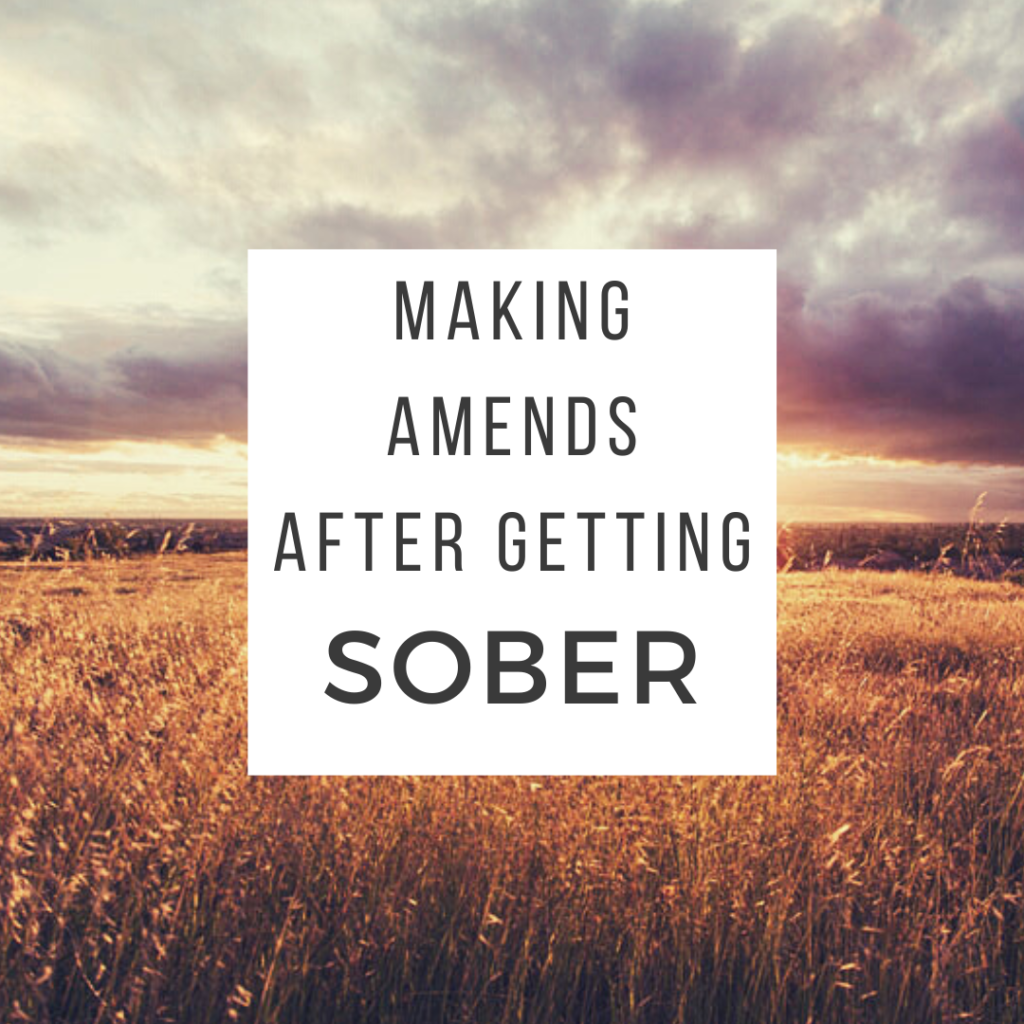Making Amends After Getting Sober
What you generally see portrayed in movies is the initial sobering up, and then the apologies for wrongs done. A dramatic and tearful scene that end in forgiveness and wrongs made right, and all is well. What you are seeing is Step 9 of the 12 Steps in action. Making amends after getting sober. In this post, I will share three ways of how to actually make an amends.
- Apologize in person
- Write a letter
- Make a living amends
Before we go over the different ways to make an amends, let’s dive deeper into what Step 9 is From the Big Book of Alcoholics Anonymous, the original 12 Step Program.
Step 9 is:
“Made direct amends to such people wherever possible, except when to do so would injure them or others.”
There will be different types of amends to be made. Those who we can apologize to quickly after getting sober, and deciding to maintain sobriety. Those who we can make partial amends, where we can’t disclose full details that would injure them or others. Some that need reflection and time. Others that we should not make personal contact with at all.
When I was just a few weeks sober, I went to an old business partner and apologized for what I felt was something I did to hurt him. Turns out he didn’t think it was that big of a deal, and accepted my apology. We concluded our meeting with a hug and a laugh. I was so proud, for the first time in my life, I swallowed my pride and had humbly and genuinely apologized and I hurried and told my sponsor what I had done. Quickly, my excitement dissipated, as she told me not to do that anymore. She told me I needed to “Work the steps in order.” It was a crushing blow. I was embarrassed and felt ashamed like I had done something wrong.
Over the years when I reflect back, I realize I was not wrong and in fact, she was wrong. I actually did everything correctly. The step says “Made direct amends WHEREVER possible” and I had done just that. Although it is best to work the steps in order, there is no hard and fast rules regarding the order of the steps. If the opportunity presents itself to provide a genuine amends, then do it.
Why its important for recovery
Making amends after getting sober is not only is it important, it’s necessary. It is truly humbling, and forces you to look at your actions, be accountable, realize the harm you have done and make an apology. For me, the likelihood of doing the same thing that I just had to humble myself and apologize for is slim. In fact, to my knowledge there is nothing I’ve done again from my initial 9th step. Being wrong and admitting it, isn’t something I like to do. And I have a feeling I’m not alone on this one!
I’ve found that even though I have been terrified at the thought of some of the amends, the people have forgiven me and embraced me with open arms. I haven’t made an amends to someone that didn’t accept my apology, although I was willing to apologize to each and every person regardless of what I thought their reaction might be.
What are the guidelines?
Making an amends isn’t a conversation or debate, or to hash out the past and point fingers about who did what to whom. This is a straight forward apology for your part, regardless of what the other person did.
My first thought after reading this step was “Wait, you mean I can’t tell the other person how I only did what I did as a reaction to how they started it!?” The answer was Nope. The inventory is yours, not theirs. You are the drunk getting sober, not them.
It’s best to keep it simple. Be honest and brief with what you are sorry for, apologize, and let them know you will not do it ever again. That’s all there is to it.
Making amends wherever possible EXCEPT when to do so would injure others. One example given in the Big Book, was using the hypothetical scenario of a drinking, unfaithful husband and his wife not knowing about his indiscretions. Should he tell her? If doing so will injure her, at the sake to save himself, no. You can’t buy your peace of mind at the expense of others.
Ok, so HOW do you do this?
I think it goes without saying, but working the previous 8 steps and being ready for Step 9. Step 8 suggests to make a list of persons you’ve harmed and become willing to make amends to them. Step 9 goes into action, and suggests you make amends, or apologize, to those on the list. Above was an example of a messy way to do it, although it wasn’t the “wrong” way, there are better more thought out ways to do it. Below are 3 examples of how to make an amends:
- Apologize in person: The first people you will make an amends to are the people closest since we tend to cause the most harm at home. Set a time aside with the person you owe and amends. Approach them with a genuine, and heartfelt apology for wrongs done with no expectations of their reaction. To minimize yelling or overreaction, an amends can be done in a public place such as a coffee shop or restaurant.
- Write a Letter: This method is used when the person is deceased, incarcerated, cannot be seen in person, or it is simply unsafe to make direct contact.
- Make a Living Amends: A living amends is where an apology cannot be made directly. For example, if you harmed your community as a whole by your actions; Driving under the influence and endangering others, causing chaos in your neighborhood with constant cop visits and loud music at night. You can make a living amends by community service, volunteering in your community, or just an overall
Do I Need To Do This To Stay Sober?
If you plan on having any type of quality sobriety, completing ALL the steps are necessary. It sounds daunting, but the relief you will feel from the weight of regrets being lifted is a gift. Below are some additional tips to keep in mind when making an amends
- Be sure you are planning on staying sober and the path
- Drop all expectations of their reaction
- Don’t do the same things again that you are apologizing for
I hope these tips are helpful for you on your sobriety journey! You may also be interested in Dealing With Anxiety in Sobriety

